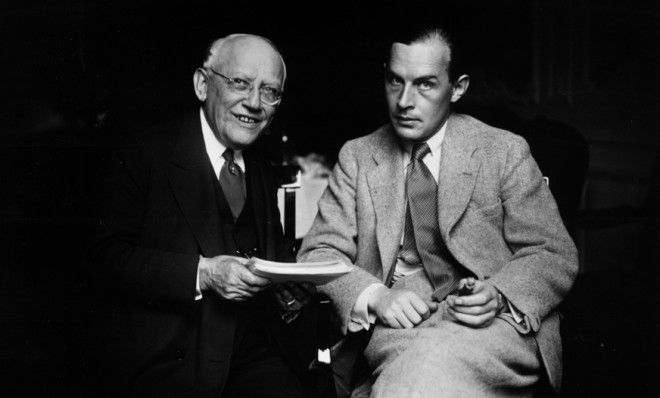4 ways Hollywood helped the Nazis
The Hollywood Reporter claims Hollywood studios went out of their way to appease the Third Reich

A free daily email with the biggest news stories of the day – and the best features from TheWeek.com
You are now subscribed
Your newsletter sign-up was successful
Before there was "Springtime for Hitler," there was, well, a springtime for Hitler in Hollywood.
In the 1930s, Hollywood studios ran scripts and films by Nazi officials to make sure they wouldn't be banned in the German market, asserts the new cover story in The Hollywood Reporter.
Excerpted from Ben Urwand's upcoming book, The Collaboration: Hollywood's Pact with Hitler, the story details how Joseph Goebbels and his Reich Ministry of Public Enlightenment and Propaganda pressured Hollywood into censoring anything that was critical of Adolf Hitler, portrayed Germany in a bad light, or focused on the mistreatment of the Jews.
The Week
Escape your echo chamber. Get the facts behind the news, plus analysis from multiple perspectives.

Sign up for The Week's Free Newsletters
From our morning news briefing to a weekly Good News Newsletter, get the best of The Week delivered directly to your inbox.
From our morning news briefing to a weekly Good News Newsletter, get the best of The Week delivered directly to your inbox.
The censorship lasted until World War II, when Hollywood began worrying more about losing business in England and France than in Germany. Here are some of the ways studio executives kept Nazi Germany happy.
1. Produced a Nazi-friendly version of All Quiet on the Western Front
When All Quiet on the Western Front was released in Germany in 1930, members of the Nazi Party (who had just dramatically increased their representation in the Reichstag, Germany's parliament) were outraged by scenes of German soldiers running away from the French during World War I.
Goebbels reportedly gave a speech from the front row of a theater balcony decrying it, while other Nazis released mice and stink bombs into the crowd. Ultimately, the movie was banned in Germany, to the consternation of Carl Laemmle, who ran Universal Pictures. The studio, according to The Hollywood Reporter, soon released a heavily edited, German-approved version of the film around the world.
A free daily email with the biggest news stories of the day – and the best features from TheWeek.com
2. Blocked a film about the mistreatment of the Jewish people in Germany
In 1933, the year Adolf Hitler came to power, a Jewish screenwriter named Herman J. Mankiewicz wrote a play about the mistreatment of the Jews in Germany called The Mad Dog of Europe, the movie rights for which were bought by producer Sam Jaffe.
Before the film got made, however, German diplomat Georg Gyssling threatened to ban all films from the United States if The Mad Dog of Europe were released. The Motion Picture Producers and Distributors Association of America pressured Jaffe not to make the film, and he eventually sold the rights to an agent named Al Rosen, who found that he couldn't convince any of the major studios to fund it.
"We have interests in Germany," said producer Louis B. Mayer, according to The Hollywood Reporter. "I represent the picture industry here in Hollywood; we have exchanges there; we have terrific income in Germany and, as far as I am concerned, this picture will never be made."
3. Hired Nazis and disassociated themselves from Jewish family and colleagues
By 1936, as German officials began rejecting more American films, the major Hollywood studios began taking more drastic measures to appease Hitler. MGM reportedly hired a Nazi, Paul Thiefes, to head its German branch. Paramount, according to The Hollywood Reporter, dubbed over new music for The General Died at Dawn because the original had been written by a Jewish composer.
Perhaps most disturbingly, Frits Strengholt, the head of MGM in Germany, divorced his Jewish wife, who was eventually sent to a concentration camp, according to Ben Urwand.
4. Sanitized an anti-Nazi film written by F. Scott Fitzgerald
MGM producer Joseph L. Mankiewicz hired F. Scott Fitzgerald, who was living in Hollywood at the tail-end of his career, to write a screenplay attacking the rise of the Nazi Party and its treatment of the Jewish people.
Despite protests from German officials, the film, Three Comrades, was shot. After a screening for Gyssling, according to The Hollywood Reporter, the producers got a list of suggested changes. The end result? A movie that was originally a condemnation of Nazism that failed to criticize the Nazis at all.
Read the entire story, excerpted from The Collaboration: Hollywood's Pact with Hitler by Ben Urwand (Harvard University Press, on sale Sept. 9), at The Hollywood Reporter.
Keith Wagstaff is a staff writer at TheWeek.com covering politics and current events. He has previously written for such publications as TIME, Details, VICE, and the Village Voice.
-
 Political cartoons for February 3
Political cartoons for February 3Cartoons Tuesday’s political cartoons include empty seats, the worst of the worst of bunnies, and more
-
 Trump’s Kennedy Center closure plan draws ire
Trump’s Kennedy Center closure plan draws ireSpeed Read Trump said he will close the center for two years for ‘renovations’
-
 Trump's ‘weaponization czar’ demoted at DOJ
Trump's ‘weaponization czar’ demoted at DOJSpeed Read Ed Martin lost his title as assistant attorney general